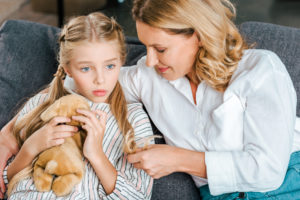Seeing Good Intentions Even When Kids Are Acting “Bad”

“A good intention, with a bad approach, often leads to a poor result.”
― Thomas Edison
Someone once told me that “people do not act with the intention to ‘be bad.'” Essentially, there is a positive intention behind every action. This is especially true when kids act "bad."
I have a couple of kids, and sometimes they “behave badly.” That is, they act in ways that are frustrating, seem uncaring, and make me question their intentions. When I remember that they are not acting with the intention to “be bad,” I can be more empathetic and caring, and the problems seem to resolve with a lot less drama.
Before I understood this perspective, every time I was ignored, or someone did something hurtful, or one of my kids broke a rule, I tended to assume that they did it to “be bad.” My anger, frustration, and disappointment were then justified, as was any discipline for their behavior. There was an action, a judgment about my child's intentions or character, and a consequence.
If a kid did not do his homework, it was because he was lazy or irresponsible. The consequence was to be grounded and to do his homework. Nothing positive came from this response. I had labeled the child as “bad,” and neither of us had learned anything to improve the situation in the future.
Now, my intentions were always (and still are) to have a positive impact on the kids, be a good role model for them and leave them feeling good about their self-worth.
Funny, jumping to conclusions about their intentions did not accomplish this.
People Have Positive Intentions
I am struck by this notion that people's actions are primarily focused on positive outcomes, rather than ill intentions. But getting at the positive intention can be difficult. It means that we have to keep an open mind, and ignore our automatic assumptions about the meaning of someone's behavior. We have to challenge our determinations about WHY they didn't do their homework, or their chores, or – heaven forbid – listen when we talk.
As a parent of a kid with ADHD, when your kid acts "bad" or in ways that seems reckless, self-destructive, or mean-spirited, you may find yourself asking (whether in your head or out loud), “What were you thinking?”
It's a great question, actually. Have you ever asked them?
When I have to interview kids about their “bad behavior,” I usually start by saying, “I assume that you did not intend to get in trouble or hurt anyone when you did.” Once they know I am not going to chastise them, they are usually open to talking about what really motivates them.
What ARE Kids Thinking When They Act "Bad"?
Kids want to feel good. They want to fit in and be accepted. They want to feel capable. They want to be noticed, heard, and cared for. And our kids – especially those with ADHD – want to feel focused, interested, motivated, and successful.
Feeling bad and wanting to feel better, wanting to be heard, feeling overwhelmed and frustrated, and, of course, feeling bored, are some of the common motivations for their “bad” actions.
When I keep the perspective that there is a positive intention behind every action, I understand that:
- When kids are bored they will start trouble just to feel engaged
- When kids feel ignored they will get loud to get our attention
- When kids feel bad they will sometimes do things that temporarily relieve the discomfort
- When kids are interested in something it “feels good,” and they often have difficulty shifting their focus to something less exciting
- Just because they said they would do something and then forgot does not mean that it was on purpose or disrespectful
- When kids are struggling on a task or subject they will make excuses to avoid that activity because it makes them feel “stupid” or “bad”
- When kids want to fit in they will sometimes act in whatever way they need to feel like their peers are noticing them.
When dealing with “bad behavior” as a caregiver and parent, I have also learned to:
- Ignore my automatic assumptions about other people's intentions
- Approach problems with an open mind
- Ask questions such as:
- “What was happening that led to your decision?”
- “What did you hope the outcome would be?”
- “Knowing what you know now, what would you do differently to get what you wanted?”
Let Conversation Replace Consequences
While consequences are sometimes necessary, learning and shaping behavior through conversation is a more powerful approach to addressing problematic behavior.
Helping your kids express their intentions and process their mistakes not only helps them learn to accept responsibility for their behavior, it also helps them learn to consider the feelings and needs of others. And it helps them develop self-control, too.
If you expect your child to always be polite, happy or cooperative, you will be disappointed. Kids are going to make mistakes, but most mistakes aren't intentional.
It's important to remember that nobody's perfect. Not your kids. And not you.
So go easy on yourself, too. You probably want to be the very best parent, ever. But you are human. Despite your best intentions, you will make mistakes. Don't get too frustrated or upset. Everyone learns through experience.
“...it's true that some if the most terrible things in the works are done by people who think, genuinely think, that they're doing it for the best, especially if there is some good involved.”
― Terry Pratchett

